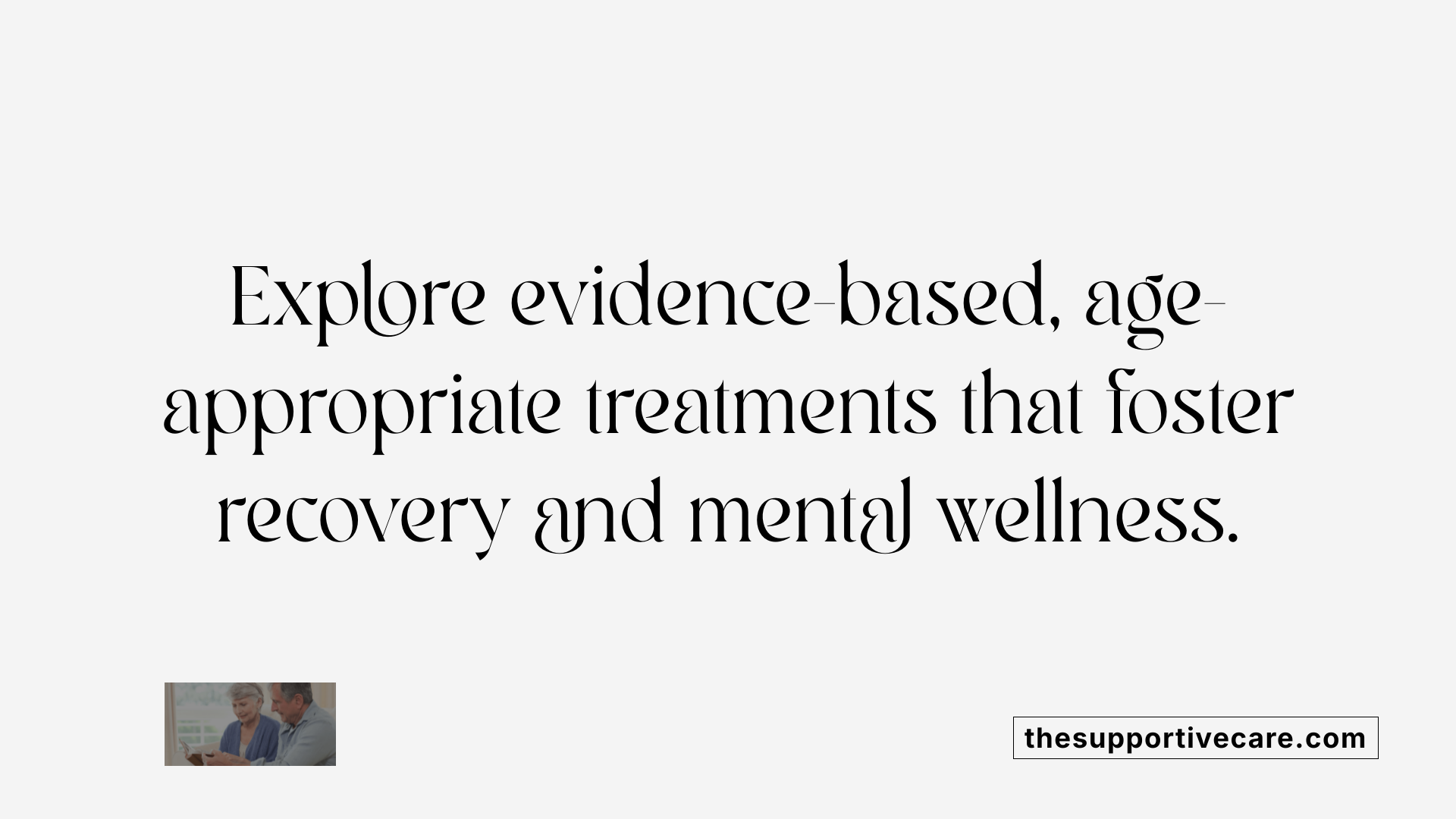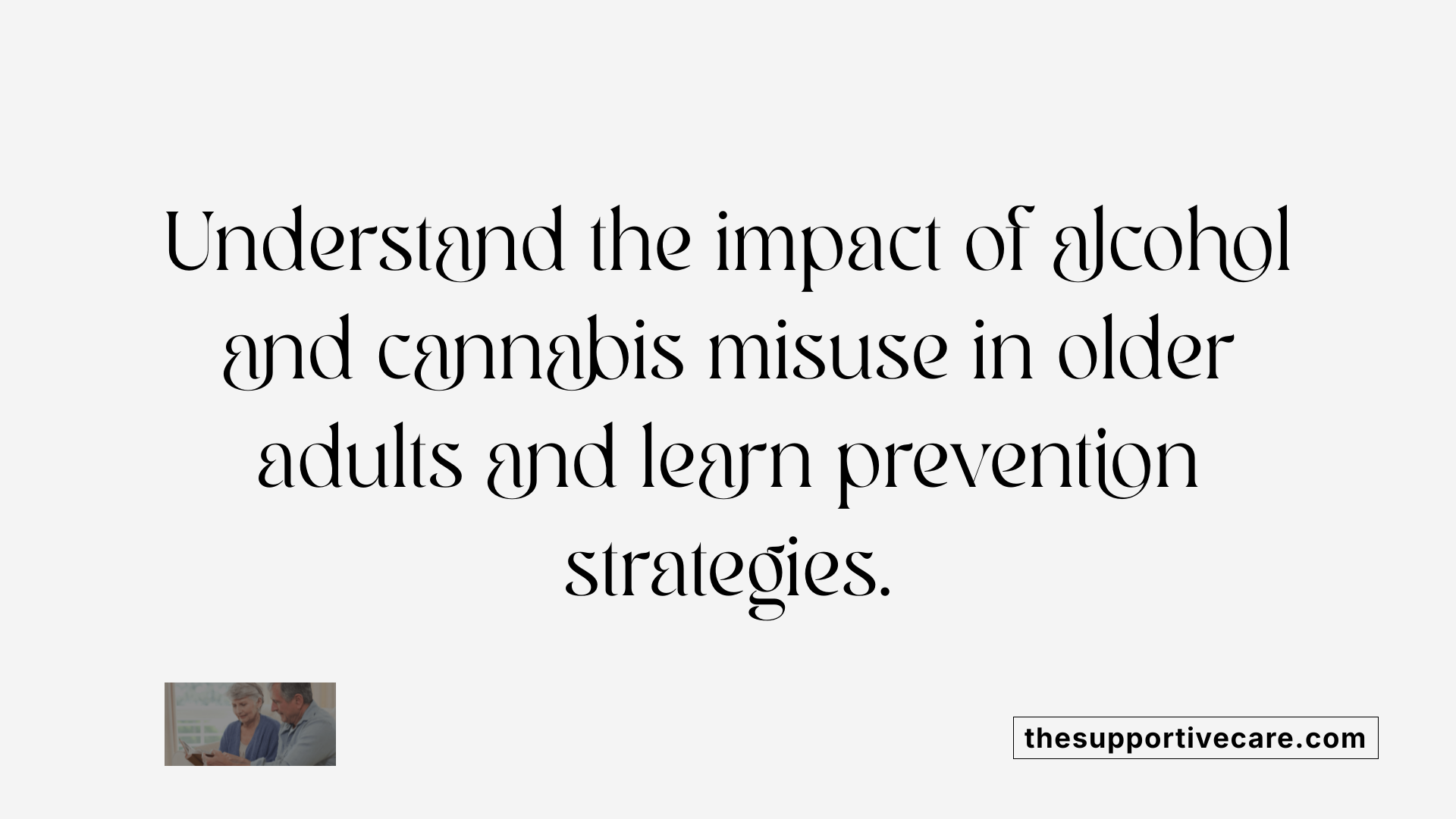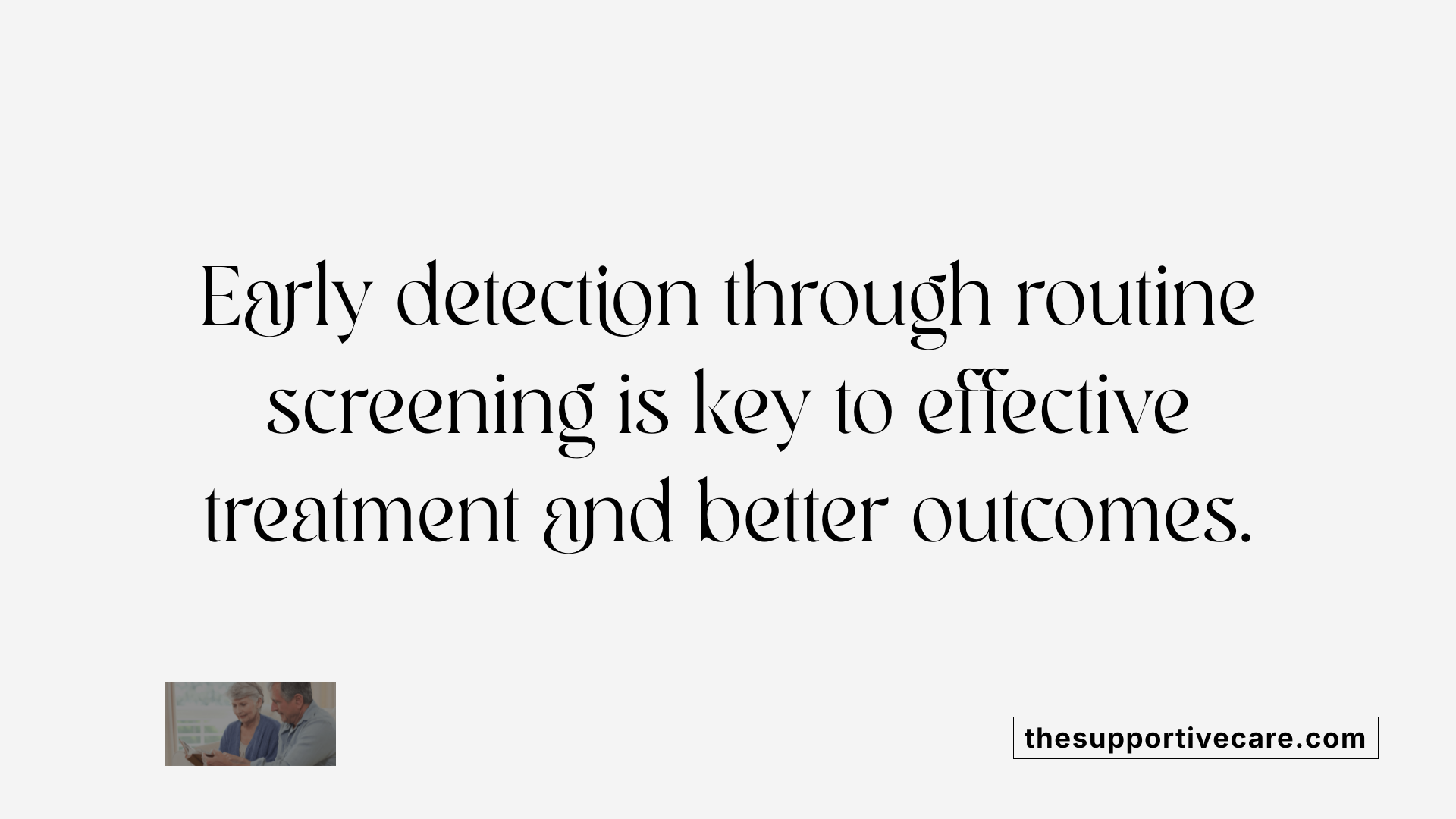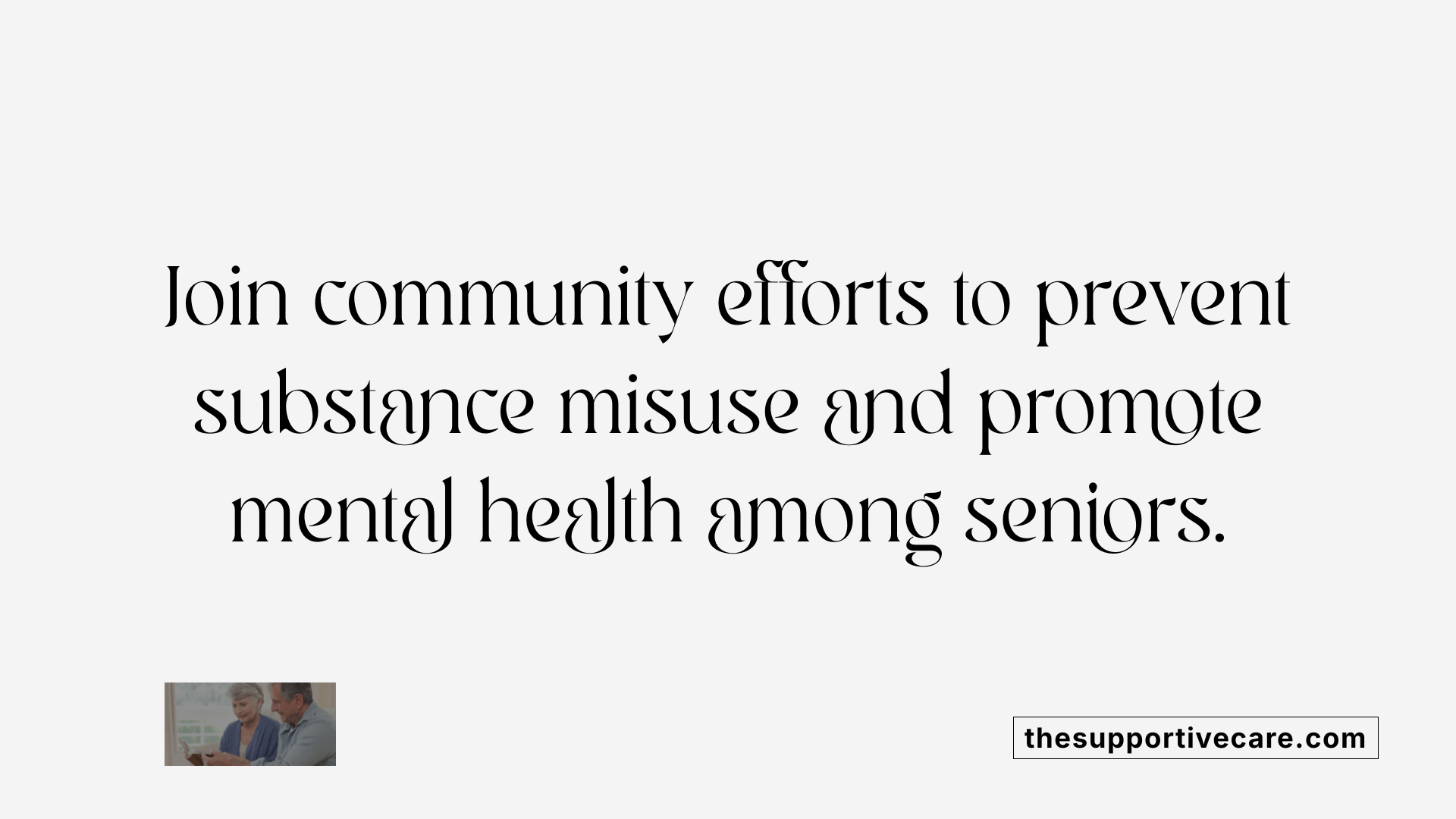Understanding the Mental Health Landscape for Older Adults
As our population ages, it becomes increasingly vital to focus on the mental health and substance use challenges faced by senior residents. Mental health education tailored for older adults is a cornerstone for empowering this demographic, promoting wellness, reducing stigma, and improving access to comprehensive care. This article offers a detailed exploration of the resources, treatment services, community support mechanisms, and specialized therapies that are critical to addressing the unique needs of seniors living with mental health and substance use disorders.
Comprehensive Treatment Services for Seniors with Substance Use and Mental Health Issues

What are the comprehensive treatment services available for substance abuse and mental health issues?
Comprehensive treatment services for seniors facing substance use and mental health challenges include a range of evidence-based modalities tailored to their unique needs. These services begin with medical detoxification, which focuses on safely stabilizing individuals experiencing withdrawal symptoms. Detox programs evaluate and prepare patients for further treatment.
Following detox, inpatient treatment offers 24/7 care within a hospital or specialized facility. This includes behavioral therapy, medication management, psychoeducation, and peer support designed to address both substance use disorders and co-occurring mental health conditions. Specialized therapy groups such as Women’s Seeking Safety or Dialectical Behavior Therapy (DBT) Recovery Skills cater to specific experiences related to trauma or gender.
Outpatient services provide flexible care options including partial hospitalization programs (PHPs), intensive outpatient programs (IOPs), and standard outpatient counseling. These allow seniors to receive treatment while maintaining community ties and family involvement.
Medication management plays a vital role, with treatments such as buprenorphine and naltrexone used for opioid use disorder, and other psychotropic medications carefully monitored due to seniors’ heightened sensitivity to drugs.
Therapeutic approaches extend beyond pharmacology, incorporating cognitive behavioral therapy (CBT), mutual-help groups like Alcoholics Anonymous (AA) and Narcotics Anonymous (NA), and evidence-based psychosocial interventions that help improve mental wellness and resilience.
Support systems including family counseling, friendly visitor programs, and community support groups aim to reduce social isolation—a major risk factor for relapse and poor health among older adults. Telehealth services also enable treatment access despite geographic or mobility barriers.
By integrating these modalities with comprehensive recovery support, including relapse prevention strategies and social network development, treatment centers create age-appropriate, compassionate care environments that foster sustainable recovery for seniors.
Tailoring Addiction Treatment to the Unique Needs of Older Adults
How do treatment programs address various forms of addiction?
Treatment programs for older adults employ a comprehensive and individualized approach to address addiction effectively. They integrate evidence-based therapies such as motivational interviewing, cognitive behavioral therapy (CBT), and dialectical behavior therapy (DBT). These therapeutic methods are adapted to meet the cognitive and emotional needs of seniors, helping them tackle addictive behaviors while also managing co-occurring mental health disorders and trauma.
Pharmacological treatments are carefully tailored to seniors considering age-related physiological changes. Medication-assisted treatments (MAT), like the use of buprenorphine for opioid use disorder, are provided with ongoing monitoring to balance efficacy and minimize adverse interactions with other medications frequently prescribed to older adults.
Family counseling plays a significant role by engaging relatives in the recovery process, enhancing social support, and addressing familial dynamics that may influence addiction. Additionally, peer support groups, including age-specific mutual-help groups such as AA or NA, cultivate a sense of community and encourage healthy lifestyle changes.
This multi-faceted strategy ensures that treatment goes beyond mere substance use, focusing on holistic recovery that embraces mental health, social connections, and resilience-building specific to the older adult population.
Addressing the Rising Prevalence of Substance Misuse Among Seniors

What are the current statistics on prevalence and increased rates of alcohol and cannabis misuse among seniors?
In 2022, substance use disorder affected approximately 1 in 11 adults aged 60 and older. Alcohol remains the most commonly misused substance, with rates of alcohol misuse—encompassing binge and heavy drinking—having risen significantly over recent decades, especially among older women. Cannabis use in adults aged 65 and above increased dramatically by 75% between 2015 and 2018. Most older adults who use cannabis do so for medical reasons such as managing pain, arthritis, sleep difficulties, anxiety, and depression.
How do substances physiologically impact older adults differently than younger populations?
Aging causes physiological changes that slow metabolism and affect the absorption of substances like alcohol and medications. Consequently, older adults experience amplified effects from smaller amounts of these substances. This heightened sensitivity exacerbates risks and complications related to substance misuse in seniors.
What risks are associated with substance misuse in the elderly population?
There are multiple significant risks for seniors misusing substances. Medication interactions can occur, as many older adults take prescriptions that may adversely interact with alcohol or drugs. Cognitive decline is another critical concern, as misuse may worsen memory loss and other neurological issues. Additionally, seniors are at increased risk of falls due to impaired coordination and balance. Overdose incidents, including emergency room visits related to cannabis poisoning, have surged due to higher concentrations of substances like THC.
These factors underscore the importance of routine screening, early intervention, and tailored prevention and treatment strategies to address substance misuse among older adults effectively.
The Critical Role of Routine Screening and Early Intervention

Challenges in identifying substance misuse and mental health issues in seniors
Substance misuse and mental health disorders in older adults often go unnoticed because symptoms can resemble common medical problems or age-related changes. This overlap complicates diagnosis and delays timely care. Physiological changes with aging enhance the effects of alcohol and drugs, leading to increased risk of falls, cognitive decline, and medication interactions. Additionally, seniors may misuse prescribed opioids, benzodiazepines, or psychoactive drugs, which can be mistaken for typical aging symptoms.
Screening tools like SBIRT in primary and community care
To address these challenges, routine screening is crucial. Programs such as SBIRT (Screening, Brief Intervention, Referral to Treatment) play a vital role by facilitating early identification of substance use issues in older adults. SBIRT is integrated into primary and community health settings, enabling healthcare providers to detect and address misuse of alcohol, prescription medications, and illicit drugs promptly.
Referral processes and early intervention strategies
Upon screening positive, older adults receive brief interventions aimed at raising awareness and motivating behavior change. Referral to specialized treatment or support services follows when necessary. Early intervention strategies include personalized counseling, medication-assisted treatment, and community support programs. These approaches help prevent progression to severe substance use disorders and improve mental health outcomes, fostering recovery and enhancing quality of life for seniors.
Combatting Social Isolation to Support Recovery and Mental Wellness
How Does Social Isolation Affect Seniors' Mental Health and Relapse Risk?
Social isolation significantly increases the risk of negative health outcomes for older adults. Seniors who lack social support often face challenges like depression, cognitive decline, and poor physical health. Isolation also elevates the risk of substance misuse relapse, making recovery more difficult to sustain. These factors contribute to a cycle whereby lonely older adults may turn to harmful coping mechanisms, intensifying both mental health struggles and substance use disorders.
Why Are Social Support Networks Effective for Seniors in Recovery?
Strong social connections are essential in helping older adults achieve and maintain recovery from substance misuse. Support from healthcare professionals, social providers, family, and peers creates a safety net that fosters emotional resilience and accountability. Participation in mutual-help groups such as Alcoholics Anonymous (AA) and Narcotics Anonymous (NA) provides older adults with a sense of belonging and promotes healthy lifestyles aligned with recovery goals. Additionally, involvement in religious and spiritual communities can alleviate feelings of loneliness and enhance overall wellness.
What Programs Help Reduce Isolation and Enhance Recovery?
Several community-based initiatives are effective in combating social isolation among seniors. Friendly visitor programs connect older adults with volunteers who offer regular companionship and social engagement. Encouraging family involvement strengthens support systems at home while community support groups enable seniors to share experiences and resources. Furthermore, social media and online platforms can expand support networks, although attention is needed to overcome technological and cost barriers to ensure accessibility.
By integrating these social support strategies with recovery services, older adults receive comprehensive assistance addressing both mental health and substance use challenges, promoting sustained wellness and quality of life.
Leveraging Spirituality, Mutual-Help, and Online Platforms in Recovery
Benefits of participation in religious or spiritual fellowships
Participation in religious or spiritual fellowships provides older adults with valuable social connection and reduces isolation. These fellowships are linked to better health and wellness outcomes by fostering environments where seniors can find emotional comfort, community, and a sense of purpose. This social engagement plays a significant role in supporting recovery from substance misuse and mental health issues.
Role of mutual-help groups such as AA and NA
Mutual-help groups like Alcoholics Anonymous (AA) and Narcotics Anonymous (NA) offer structured peer support for older adults on the path to recovery. These groups promote healthy lifestyles and provide social connection, which aids in maintaining abstinence and long-term recovery. They create a safe space for sharing experiences and developing accountability among peers.
Use of social media and digital tools to enhance support networks
Digital platforms and social media offer innovative ways for older adults to expand their support networks and mitigate loneliness. Online forums, video meetings, and social networking sites can increase access to peer support and wellness activities, helping seniors stay connected even when physical attendance is challenging.
Barriers like technology literacy and access
Despite these benefits, many older adults face barriers such as limited technology literacy and financial constraints that restrict their ability to access digital support tools. Addressing these challenges requires providing education on technology use and ensuring affordable internet access to maximize the positive impact of online recovery resources.
Specialized Therapy and Programs Addressing Seniors’ Mental Health Needs
What does geriatric therapy for depression, anxiety, dementia, and relational challenges involve?
Geriatric therapy focuses on providing mental health support tailored to older adults dealing with conditions such as depression, anxiety, loneliness, cognitive decline like dementia, and complex relational dynamics, including caregiver relationships. This specialized therapy helps seniors process emotions related to aging and end-of-life, develop coping skills, and improve overall quality of life. Counseling can also offer objective assessments to caregivers, aiding in managing dementia symptoms like memory loss and associated anxiety or depression.
Which evidence-based programs support mental health in older adults?
Several evidence-based programs have been developed to address depressive symptoms and promote recovery in seniors, including:
- PEARLS (Program to Encourage Active, Rewarding Lives for Seniors): A home-delivered intervention focusing on behavioral activation techniques to reduce depressive symptoms and enhance quality of life.
- Healthy IDEAS (Identifying Depression, Empowering Activities for Seniors): Combines depression self-management with screening, education, and behavioral activation adapted for older adults with chronic health issues.
- WRAP (Wellness Recovery Action Plan): A group-based illness self-management program helping participants identify wellness resources and develop personal plans to manage everyday stressors and symptoms.
How is Cognitive Stimulation Therapy used for dementia patients?
Cognitive Stimulation Therapy (CST) is a specialized form of therapy designed to preserve cognitive functioning in seniors with dementia. CST involves engaging individuals in themed group activities and mental exercises to stimulate thinking, memory, and social interaction, ultimately aiming to improve cognitive performance and quality of life.
What role do integrated community mental health efforts play?
Community programs are actively integrating mental health services specifically designed for older adults. For instance, the Screening, Brief Intervention, and Referral to Treatment (SBIRT) program helps identify substance use concerns early and connects seniors to appropriate treatment.
Other combined intervention models like the Maryland Living Well Center of Excellence use coordinated approaches incorporating PEARLS and other wellness programs to reduce depression symptoms among the elderly, particularly during challenges such as the COVID-19 pandemic. The University of Kentucky also implements interventions targeting depression and unmet care needs among seniors and caregivers, including those with dementia. These efforts reflect a broader movement for community and state agencies supported by government funding to expand access to effective mental health care for older adults.
| Therapy/Program | Focus Area | Description |
|---|---|---|
| Geriatric Therapy | Depression, Anxiety, Dementia | Counseling addressing emotional, cognitive, and relational challenges in aging adults. |
| PEARLS | Depression Management | In-home behavioral activation to reduce depressive symptoms and improve life quality. |
| Healthy IDEAS | Depression Self-Management | Combines screening, education, and behavioral activation for seniors with chronic illness. |
| WRAP | Illness Self-Management | Group intervention focused on wellness resource identification and stress symptom management. |
| Cognitive Stimulation Therapy | Dementia Care | Group activities targeting cognitive preservation in dementia patients. |
| SBIRT | Substance Use Screening | Community-based early screening and referral program for substance misuse in older adults. |
Supporting Older Adults Through Medicare and Insurance Coverage for Treatment

What mental health and substance use services does Medicare cover for older adults?
Medicare provides significant support for mental health and substance use disorder treatment among older adults. Specifically, Medicare Part A covers inpatient hospital care, including psychiatric hospital services, with a lifetime limit of up to 190 days in psychiatric hospitals. Meanwhile, Medicare Part B offers coverage for outpatient mental health services such as individual and group psychotherapy, family counseling, psychiatric evaluations, medication management, diagnostic tests, and preventive visits that incorporate mental health screenings.
Are medication-assisted treatment and telehealth options available for seniors?
Yes, medication-assisted treatment (MAT) is available and covered under Medicare for opioid use disorder, including medications like buprenorphine, counseling, toxicology testing, overdose education, and emergency medications such as naloxone. Telehealth services also play a crucial role, allowing seniors to access treatment for substance use and mental health disorders from any location across the U.S., including the convenience and safety of their own homes.
What are the coverage limitations and advocacy efforts for expanding benefits?
Despite these offerings, Medicare's mental health coverage is not as extensive as other healthcare services. This limitation partly stems from the fact that the Mental Health Parity and Addiction Equity Act does not fully apply to Medicare, restricting comprehensive parity in coverage. Advocacy groups, including the Center for Medicare Advocacy, are actively working to expand Medicare's coverage to better meet older adults’ mental health and substance use treatment needs by pushing for parity law extensions and broadening treatment modalities. These efforts are critical for enhancing access and ensuring that seniors receive equitable and adequate care.
Holistic and Evidence-Based Approaches in Senior Treatment Centers
Accredited Treatment Centers Offering Specialized Care for Seniors
Many treatment centers, such as Sunrise Treatment Center, Individual Care Center Inc, eXclusive Services, and Court Clinic, provide comprehensive and specialized services tailored for older adults. These centers cater specifically to the unique mental health and substance use challenges faced by seniors, including issues related to alcohol, prescription opioids, and benzodiazepines. Their accreditation by reputable organizations ensures high-quality, evidence-based care designed to meet the complex needs of this demographic.
Integration of Behavioral Therapies and Medication-Assisted Treatments
Senior-focused treatment approaches combine behavioral therapies like Cognitive Behavioral Therapy (CBT), Dialectical Behavior Therapy (DBT), and group therapy with medication-assisted treatments (MAT). This integration helps address both the psychological and physiological aspects of addiction and mental health disorders. Services include outpatient detoxification, dual diagnosis care for co-occurring disorders, and tailor-made specialty care groups that attend to trauma and gender-specific experiences.
Acceptance of Various Insurances and Sliding Scale Payments
To facilitate access to care, many centers accept a broad range of insurance plans, including Medicare, Medicaid, private insurance, and provide sliding scale payment options. This flexibility ensures that seniors from diverse socioeconomic backgrounds can receive essential treatment services without financial barriers.
Programs for Unique Populations Including Criminal Justice-Involved Seniors
Programs are also designed to support unique senior populations, such as those involved in the criminal justice system. Court Clinic, for example, offers specialized services to senior offenders, integrating addiction treatment with legal and social support. This targeted approach helps address the intersecting challenges of mental health, substance use, and justice involvement among older adults.
Community Outreach, Prevention, and Education Initiatives for Older Adults

Collaboration with Courts, Hospitals, and Law Enforcement
Community outreach programs for older adults with substance use issues involve partnerships with courts and hospitals to ensure coordinated care and support. These programs also work with law enforcement through pre-arrest deflection initiatives, aiming to divert individuals from the criminal justice system into treatment and recovery services. Such collaboration facilitates early intervention and continuous support tailored to seniors' specific needs.
Prevention Programs Targeting At-Risk Families and Youth
Prevention efforts address not only older adults but also at-risk families and youth in the community. These programs include evidence-based vaping prevention and education focused on risky behaviors that may impact mental health and substance use later in life. By engaging families and younger generations, these initiatives help reduce the likelihood of substance misuse and its associated consequences as individuals age.
Education Toolkits and Resources for Providers and Seniors
Educational materials such as guides and toolkits are designed to raise awareness among healthcare providers, organizations, and older adults themselves about substance misuse and mental health challenges. These resources facilitate comprehensive treatment approaches and support the adoption of evidence-based practices. They also help bridge gaps in understanding through practical guidance on implementation, including psychosocial interventions and workforce considerations.
Focus on Suicide Prevention and Mental Health Promotion
Specialized resources are available to address suicide prevention among older adults, including toolkits and inventories aimed at promoting mental health and reducing suicide risk. These materials support healthcare providers and policymakers by offering updated and authoritative information about effective programs and initiatives. Emphasizing early identification, prevention, and wellness, the resources contribute to holistic strategies for mental health promotion in the aging population.
Empowering Seniors Through Informed Mental Health Education and Support
Empowering senior residents through tailored mental health education and comprehensive treatment services is essential to meet their specific challenges related to substance use and mental health. Providing accessible resources, supporting social connectedness, and ensuring coverage through Medicare and other payers dramatically improve outcomes. By integrating specialized therapies, evidence-based programs, prevention strategies, and robust community support, we can foster resilience and enhance quality of life for older adults. Continued advocacy and education are crucial to closing gaps in care and enabling seniors to live healthier, more fulfilling lives.
References
- Resources for Older Adults
- Chapter 7—Social Support and Other Wellness Strategies for ...
- Recovery Services - Public Health - Dayton & Montgomery ...
- Treating substance misuse in older adults
- Geriatric and Seniors Treatment Centers in Kentucky
- Evidence-Based Practices Resource Center
- Addiction Rehab for Seniors & Elderly Adults
- Medicare Coverage of Mental Health and Substance ...
- Advancing Behavioral Health Programs for Older Adults


































































































